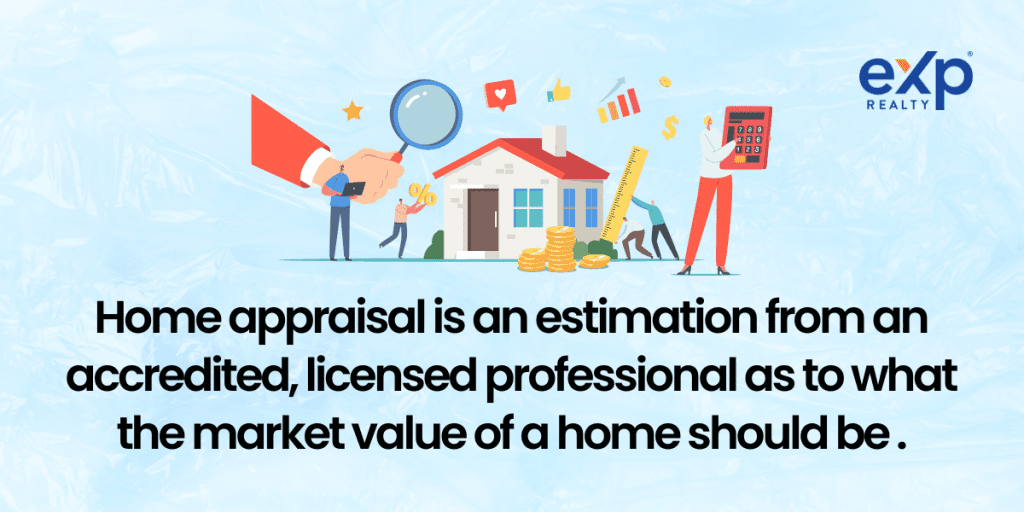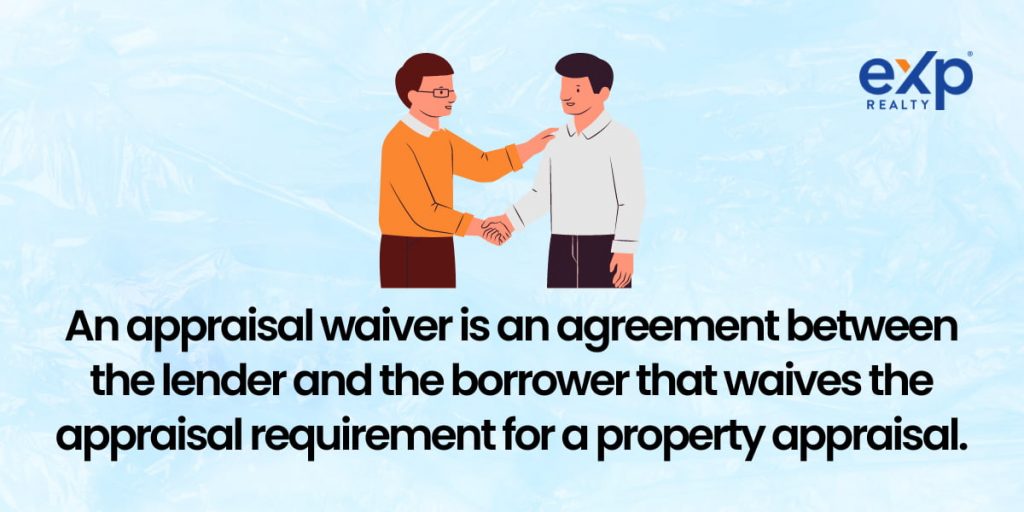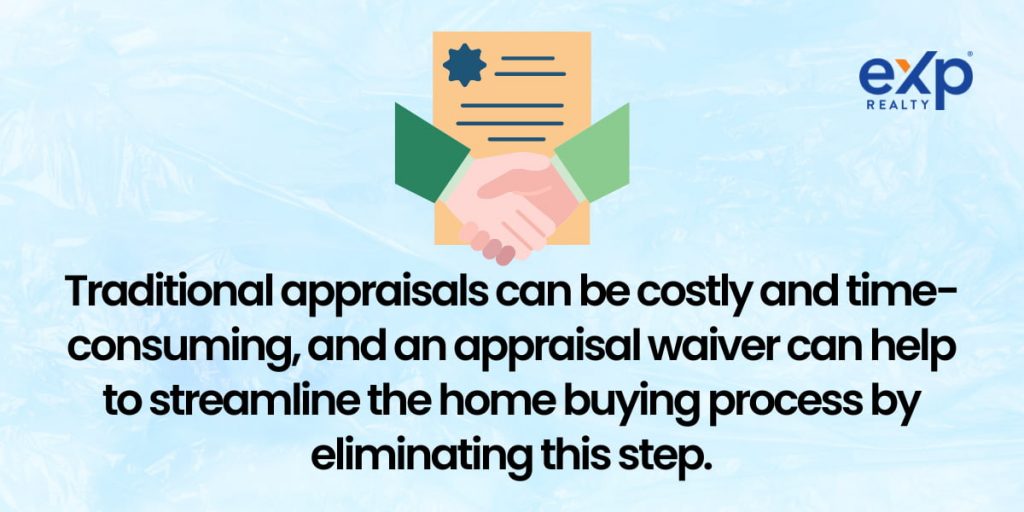An appraisal is a critical stage in the home-buying process. Lenders frequently need this professional valuation of a property’s value to ensure the property type is worth the requested loan amount. A house buyer could, however, be able to get an appraisal waiver in particular circumstances.
If you’re a first-time homebuyer in the Orlando, FL, real estate market or anywhere else, this article will explain what an appraisal waiver is, why you must understand it, and how it works during the transaction. We will also discuss the benefits and drawbacks of an appraisal waiver and offer critical takeaways to guide readers toward informed decisions.
What Is an Appraisal?

An appraisal is a property analysis by a licensed appraiser, who will inspect the property and gather information about comparable properties in the area to determine an estimated value for the property.
The appraiser then submits their findings to the lender, who uses the value to determine how much money should be lent to a borrower. Lenders typically require appraisers to protect their investment properties and ensure that the purchased property meets specific requirements.
Appraisal and The Property’s Value
Appraisals are a crucial part of the home-buying process because they provide an impartial, professional evaluation of a property’s value. This helps ensure that the seller and buyer agree on a fair and reasonable rate; it also protects the lender from making loans that exceed the property’s value.
A professional appraisal can identify any concerns about a property that may not have been immediately apparent to the buyer, such as structural issues or needed repairs. This information can be helpful to both the buyer and the lender when negotiating the purchase price or deciding whether to proceed.
What Is an Appraisal Waiver?

An appraisal waiver is an agreement between the lender and the borrower that waives the appraisal requirement for a property appraisal. This means the lender will not require an appraisal of the property before issuing a conventional loan.
Instead, the lender will use alternative methods to determine the property’s value, such as Fannie Mae’s (also known as Desktop Originator) and Freddie Mac’s (also known as Loan Prospector) automated underwriting system or relying on the purchase price agreed upon between the buyer and seller.
Appraisal waivers help qualified home buyers or loan applicants streamline the home-buying process by eliminating a time-consuming and costly step. A traditional appraisal can take time, and an appraisal waiver can help buyers to close on a property more quickly by enabling them to skip this step. Additionally, an appraisal waiver can help buyers to close on a property more quickly, as the lender does not need to wait for an appraisal report before issuing a loan.
Alternatives to In-Person Appraisals
Appraisal waivers allow lenders to determine the value of subject property without physically inspecting it. For example, an automated underwriting process uses data and algorithms to estimate a property’s value rather than relying on an in-person appraisal. In other cases, the lender may depend on the purchase price agreed upon between the buyer and seller as evidence of the property’s value.
While appraisal waivers are available for some loans, like conventional loans tied to a single-family home, only some lenders offer them. They are only sometimes suitable for some loan applicants.
Additionally, loan types such as VA (Veteran Affairs) or FHA (Federal Housing Administration) do not have appraisal waiver options. Also, new construction loans, two to four-unit properties, and leasehold properties are some of the transactions not eligible for an appraisal waiver.
When Would I Need an Appraisal Waiver?
Home buyers might ask for an appraisal waiver if they are still determining the value of their property. An appraisal waiver, for instance, can help to speed up the deal and avoid the expense and time of an appraisal if a buyer is buying a home in a down market or if the property has known concerns that will impair its value.
Another situation in which a home buyer may need an appraisal waiver is if they have a less established relationship with their lender. For example, suppose the buyer has a limited credit score history or has yet to work with the lender. In that case, a waiver can demonstrate trust in the person’s payment ability and faith in the property’s value.
Appraisal Waivers And The Market
In another situation, an appraisal waiver may be required if the market is uncertain or volatile. An appraisal waiver might help prevent potential delays and problems if the market is in flux, and an appraisal may need to reflect the property’s actual value accurately.
Lastly, if not much time has passed since the last appraisal and the market has stayed the same, an appraisal waiver can be a good option. This is so that the lender may rely on the previous value, as it is likely that the property’s worth has stayed the same after the last appraisal.
Benefits of an Appraisal Waiver

The primary benefit of an appraisal waiver is the ability to avoid the cost and time of an appraisal. Traditional appraisals can be costly and time-consuming, and an appraisal waiver can help to streamline the home buying process by eliminating this step. This can be especially beneficial for buyers working with tight timelines or budgets.
Another benefit of an appraisal waiver is the faster closing process. Since the lender does not need to wait for an appraisal report before issuing a loan, the closing process can be completed more quickly. This can be especially beneficial for buyers looking to move into their new home as soon as possible.
A More Simple And Flexible Home-Buying Process
Appraisal waivers can also help to simplify the home-buying process. Without the need for an appraisal, buyers can avoid the stress and uncertainty of waiting for an appraisal report and can focus on other aspects of the home-buying process.
Additionally, appraisal waivers can also offer some flexibility for the buyers. As the lender does not need to wait for an appraisal report before issuing a loan, the buyers can have more flexibility in their closing date and plan their moving accordingly.
Lastly, appraisal waivers may also be helpful for buyers who are purchasing a property that is difficult to appraise. For instance, if the property is unique or located in a remote area, an appraisal waiver can help avoid potential issues that arise from an appraisal.
Risks of an Appraisal Waiver
One of the main risks of an appraisal waiver is the potential for the home value to be underestimated. Since the lender is not conducting a physical inspection of the property, they may rely on alternative methods, such as automated valuations, to determine its value. These methods may not consider important factors such as the property’s condition or unique features that could affect its value.
Another risk of an appraisal waiver is the potential for the lender to require an appraisal despite the waiver. This can occur if the lender has concerns about the property’s value or if the market conditions change significantly after the loan application is processed. This can lead to delays and additional costs for the buyer.
Limited Options For Home-Buyers
Appraisal waivers can also limit the options for buyers. Not all lenders offer appraisal waivers, and some government-backed loans, such as VA and FHA, do not offer appraisal waiver options. This can limit buyers’ chances to take advantage of these loan programs.
Additionally, an appraisal waiver can put a buyer in a difficult situation if they are unfamiliar with the local market. If the market conditions change after the loan is issued, the buyers may find themselves in a difficult financial situation if the property value drops.
Lastly, it’s important to note that buyers who apply for an appraisal waiver will not have the opportunity to contest the home’s value if they believe it was appraised too low. They will have to accept the value that was determined by the lender and may give the payment more than the fair market value for the property.
Key Takeaways

In summary, an appraisal waiver can be a convenient option for borrowers, especially those with excellent credit scores, but it is essential to weigh the risks and benefits before deciding. It’s important to understand that an appraisal waiver is not always available, and not all lenders offer them. Not all properties are suitable for an appraisal waiver, and some may require an appraisal.
The benefits of an appraisal waiver include:
- Avoiding the cost and time of an appraisal
- A faster closing process
- Simplifying the home-buying process
However, there are also risks associated with an appraisal waiver, such as”
- The potential for the home value to be underestimated
- The potential for the lender to require an appraisal despite the waiver
It is always recommended to consult with a qualified mortgage lender and professional real estate agent before deciding on an appraisal waiver. They can help you understand the local market conditions and determine if an appraisal waiver is a good option for your specific situation. Additionally, they can help you understand the options and guide you through the appraisal process.
FAQs About The Appraisal Waiver
The following are the frequently asked questions regarding appraisal waiver.
Is it a good idea to waive home appraisal if the lender’s automated valuation system says no appraisal is needed?
It depends on the specific situation and the property being purchased. While waiving an appraisal may save time and money, it also poses risks, such as the potential for the home value to be underestimated.
It is essential to consult with a lender and real estate professional and understand the local market conditions before deciding. Additionally, it’s important to remember that not all properties are suitable for an appraisal waiver, and some may require an appraisal.
Why would a lender waive appraisal?
Lenders may waive an appraisal for several reasons, such as if the property has been previously appraised and market conditions haven’t changed significantly, if the property type is new construction, if it’s in a declining market, or if there is a strong relationship between the lender and borrower.
However, it’s important to note that lenders won’t waive an appraisal on all loans; in some cases, they may be required by law to carry out an appraisal. Additionally, they may have internal policies to decide whether they will waive an appraisal.
How common are appraisal waivers?
Appraisal waivers are becoming more common due to the COVID-19 pandemic, as lenders and borrowers are looking for ways to speed up the loan process and reduce costs. However, it’s important to note that not all lenders offer appraisal waivers, and some government-backed loans, such as VA and FHA loans, do not have appraisal waiver options.
Additionally, the usage of appraisal waivers may also depend on the local real estate market conditions and the lender’s internal policies.
Why would a seller want a buyer to waive appraisal?
Because it hastens the closing process and increases the buyer’s interest in the sale, a seller may request that a buyer waive an appraisal. An appraisal waiver can also prevent the transaction from being delayed due to appraisal issues.
It’s crucial to remember that the buyer should only consent to forego an appraisal after fully knowing the dangers involved and speaking with a lender and real estate expert. The seller should also be informed that if the property value is lower than anticipated, the buyer can decide not to proceed with the eligible transaction.
How risky is waiving appraisal contingency?
Waiving an appraisal contingency can be risky because it removes the buyer’s protection if the property value is less than the purchase price. With an appraisal contingency, the buyer may be able to purchase the property even if it is overpriced.
Additionally, a waiver of an appraisal contingency may expose the buyer to additional risks, such as a lender not agreeing to the purchase price or the house not being inspected. Therefore, buyers must understand the risks, carefully consider local market conditions, and consult with a lender and real estate professional before waiving an appraisal contingency.
What are the pros of waiving appraisal?
The pros of waiving appraisal include the following:
- Faster closing process
- Avoiding the cost and time of an appraisal
- Simplification of the home-buying process
- Potential for a higher sales price for the seller
- It could be a good option in a hot market where properties are in high demand
- Avoid delays caused by low appraisals
- It could increase the chances of the sale going through
What are the cons of waiving appraisal?
The following are the cons of waiving appraisal:
- Potential for home value to be underestimated
- The lender may require an appraisal despite the waiver
- Removal of protection for the buyer in case the property value is less than the purchase price
- Buyer may be obligated to purchase the property even if it is overpriced
- Exposure to additional risks, such as the lender may not agree to the purchase price, or the house may not pass inspection
- Not all properties are suitable for an appraisal waiver, and some properties may require an accurate appraisal
- Not all lenders offer appraisal waivers
- Some government-backed loans, such as VA and FHA, do not have appraisal waiver options.





